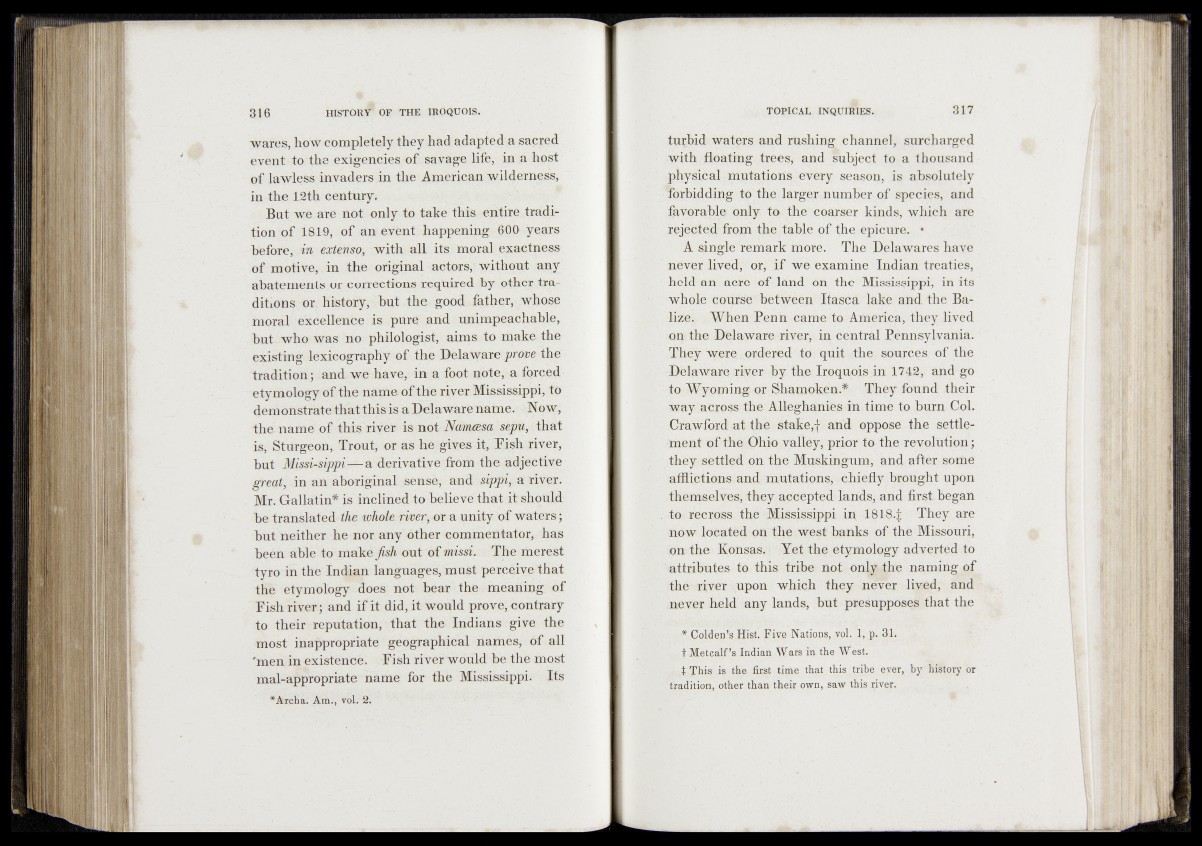
wares, how completely they had adapted a sacred
event to the exigencies <of savage life, in a host
of 1 awlo^s invaders in the American wilderness,
in the 12th century
But we are not on!y to take this entire tradition
of 1819, of an event happening 600 years
b e f o r e , in extenso, with all its moral exactness
of motive, in the original actors,' without any
abatements or corrections required by other traditions
or history, but the good father, whose
moral excellence is pure and Unimpeachable,
but who was no philologist, aims to make the
existing lexicography of the Delaware prove the
tradition; and, we have^ in a foot note, a forced
etymology of the name of the river Mississippi, to
demonstrate that this is a Delaware name,. -*Now,
the name of this river is not Namcem sepu, that
is, Sturgeon, Trout, or as he gives it, Fish river,
but Missi-sippir—a derivative from the adjective
great, in an aboriginal sense; and $ippi, a river.
Mr. Gallatin* is inclined to believe that it should
be translated the whole, river, or a unity of waters;
but-neither he nor any other commentator^ has
been able to make out of misd. The merest
tyro in the Indian languages, must perceive that
the etymology does not bear the meaning of
Fish river; and if it did, it would prove, contrary
to their reputation, that the Indians give the
most inappropriate geographical names, of all
'men m existence.. Fish river would be the most
mal-apipropriate name for the Mississippi. Its
-jtercha. Am., voh'2.
turbid waters and rushing channel, surcharged
with floating trees, and subject to a thousand
physical mutations every season, is absolutely
^prbiddipg to the larger number of species, and
favorable only to the coarser kinds, which are
rejèctelf from the table of the epicure. *
A single remark more. The Delawares have
never lived, or, if we examine f Indian treaties,
held an acre of land on the Mississippi, in its
whole: course between Itasca lake and the Ba-
lizel^ When Penn came to America, they lived
on the Delaware river, in central Pennsylvania.
They were, ordered to quit the sources of the
Delaware river by the Iroquois .in 1742, and go
to Wyoming or Sliamoken.* They found iheir
way acrpss the Alleghanies in time to burn Col.
Crawford at the stake,-f- and oppose the settlement
of the Ohio valléy, prior to the revolution;
they* settled on the Muskingum, and after some
afflictions, and mutations,. chiefly brought upon
themselves, they accepted lands, and first began
to recross the Mississippi in They, are
now located on tlm west bunks of the Missouri,
on the Konsas.: Yet the etymology adverted to
attributes to this tribe not only the naming qf
the river upon which they never lived, and
never held any lands, but -presupposes that the
■ * Golden's Hist. Five Nations, vpl. 1, £>• 3 Iv
+ Metcalf’s Indian Wars in the West.
| q T h is i s the first time that this tribe ever, by history or
tradition, other th a n their own, saw this river-. '